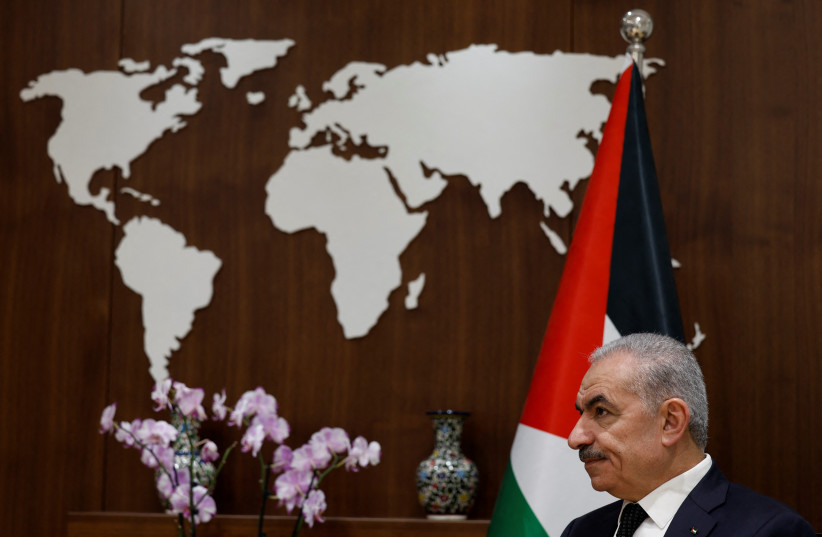Palestinian Authority Prime Minister Mohammad Shtayyeh has called on rival group Hamas to join the Palestine Liberation Organization's political program.
For more stories from The Media Line go to themedialine.org
In an interview with the United Arab Emirates Sky News Arabia on Saturday, Shtayyeh pointed out that communications between the PA and Hamas are currently carried out indirectly through Egypt and Qatar.
The PA, which once managed Palestinian affairs in both the West Bank and the Gaza Strip, was forced out of Gaza by Hamas in 2007 and has since been restricted to ruling the West Bank, while Hamas has ruled Gaza.
Hamas was formed in the late 1980s as an Islamist rival to the PLO, which was coming to terms with Israel’s existence. Designated a terrorist organization by the US, Israel, and the European Union, Hamas rejects the existence of Israel entirely.

Ismail Haniyeh, the Qatar-based head of Hamas’s political bureau, said in December that Hamas was open to discussing any initiative that would bring an end to the current war in the Gaza Strip without “excluding the Palestinian resistance from any future arrangements.”
“Any bet on arrangements in Gaza or on the Palestinian issue in general without Hamas and the resistance factions is an illusion and a mirage,” Haniyeh said.
In his interview, Shtayyeh also announced a comprehensive reform program aimed at revitalizing the PA. The Biden Administration has put pressure on the PA to fight corruption and institute political reforms as a prerequisite for the group taking civilian control of Gaza once the fighting ends.
The reform package, launched under the auspices of PA President Mahmoud Abbas, involves the appointment of new regional governors. Abbas fired 12 governors in August with no stated reason.
Also included in the proposed reforms are changes in how security forces are recruited, liberalization of the media market, and a restructuring of the health sector, including the provision of universal healthcare.
Critics say that many of the reforms will leave the same leadership in power and change little on the ground, failing to effectively rebuild trust in the PA.
In an op-ed published in November, US President Joe Biden wrote that an end to the current war “is not peace.” Lasting peace and stability could be achieved through a reunited Gaza Strip and West Bank, governed under “a revitalized Palestinian Authority,” Biden wrote.
Under Prime Minister Benjamin Netanyahu, Israel has stated its plans to crush Hamas in the wake of the group's murderous attack on Israel on October 7.
However, Netanyahu’s government does not trust the PA to pursue peaceful coexistence. Netanyahu opposes a two-state solution and is hoping to cultivate a new technocratic leadership in Gaza as an alternative to the PA.
Shtayyeh’s call for Hamas to join the PA seems optimistic. Not only did Hamas push the PA out of Gaza in a civil war, but four subsequent agreements between the sides have not been implemented.
Hamas saw its popularity spike following the October 7 attacks on southern Israel, while the PA's and Abbas’s popularity ratings are at an all-time low.
A Hamas-Fatah partnership?
An aide to Abbas told The Media Line that Hamas would be welcome to join a technocratic postwar government on condition that it take a second seat to Fatah, the largest faction in the PLO and the PA’s ruling party, and either join the PLO or accept all agreements signed between the PLO and Israel.
Speaking under condition of anonymity, a Hamas official told The Media Line that the group, in principle, does not oppose joining the PLO. Hamas would want to join in full partnership with Fatah and be given proportional representation, he said.
The official said that in order for that to happen, the PA leadership would need to believe in the necessity of change and cooperation with Hamas. He said Hamas wanted to rebuild and reform the PLO so that “Hamas and the rest of the Palestinian factions can be a real part of it.”
Jamal Al-Fadi, a professor of politics and international relations at Gaza’s Al-Azhar University, told The Media Line that US Secretary of State Antony Blinken was trying to plan a future for postwar Gaza despite Israel’s “lack of a strategic plan and vision” for its own involvement in the enclave once the war ends.
“The PA wants a solution in which Hamas is a part or at least agrees to it. Otherwise, it would involve involvement in a civil war or a new internal conflict,” Al-Fadi said.
US-based Middle East expert Hasan Awwad told The Media Line that Hamas “is part of the fabric that makes up the Palestinian society, and no one has the right to dismiss them.”
Awwad said that Israel would not succeed in defeating Hamas’s ideology nor in dismantling its military and political structures.
“Hamas ideology exists well beyond Gaza, in the refugee camps, in the West Bank, and in the minds of many Palestinians. Israel can't kill all of those people," he said.
